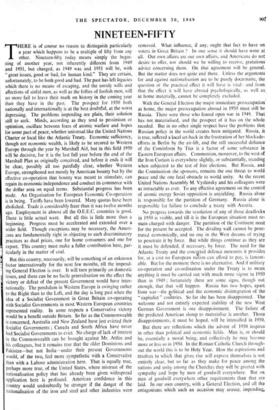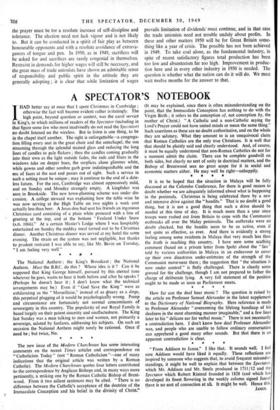NINETEEN-FIFTY
THERE is of course no reason to distinguish particularly a year which happens to be a multiple of fifty from any other. Nineteen-fifty today means simply the begin- ning of another year, not inherently different from 1949 and 1951, but charged, as 1949 was and 1951 will be. with " great issues, good or bad, for human kind." They are certain, unfortunately, to be both good and bad. The past has left legacies which there is no means of escaping, and the unruly wills and affections of sinful men, as well as the follies of foolish men, will no more fail to leave their mark on history in the coming year than they have in the past. The prospect for 1950 both nationally and internationally is at the best doubtful, at the worst depressing. The problems impending are plain, their solution still to seek. Minds, according as they tend to pessimism or optimism, oscillate between fears of atomic warfare and hopes for some pact of peace, whether universal like the United Nations Charter or local like the Atlantic Treaty. Economic sufficiency, though not economic wealth, is likely to be secured to Western Europe through the year by Marshall Aid, but in this field 1950 will be decisive, for it is the last full year before the end of the Marshall Plan as originally conceived, and before it ends it will be clear, possibly all too painfully clear, whether Western Europe, strengthened not merely by American bounty but by the effective co-operation that bounty was meant to stimulate, can regain its economic independence and conduct its commerce with the dollar area on equal terms. Substantial progress has been made. An Organisation for European Economic Co-operation is in being. Tariffs have been lowered. Many quotas have been abolished. Trade is considerably freer than it was twelve months ago. Employment in almost all the 0.E.E.C. countries is good. There is little actual want. But all this is little more than a beginning. Progress must be accelerated and extended over a wider field. Though exceptions may be necessary, the Ameri- cans are fundamentally right in objecting to such discriminatory practices as dual prices, one for home consumers and one for export. This country must make a fuller contribution here, par- ticularly in the matter of coal. .
But this country, necessarily, will be something of an unknown factor internationally for the next few months, till the impend- ing General Election is over. It will turn primarily on domestic issues, and there can be no facile generalisation on the effect the victory or defeat of the present Government would have inter- nationally. The pendulum in Western Europe is swinging rather to the Right than to the Left, and the day is long past when the idea of a Socialist Government in Great Britain co-operating with Socialist Governments in most Western European countries represented reality. In some respects a Conservative victory would be a benefit outside Britain. So far as the Commonwealth is concerned, Australia and New Zealand have just evicted their Socialist Governments ; Canada and South Africa have never had Socialist Governments to evict. No charge of lack of interest in the Commonwealth can be brought against Mr. Attlee and his colleagues, but it remains true that the older Dominions and Pakistan—but not India—under their present Governments would, of the two, feel more sympathetic with a Conservative than with a Labour administration here. That is equally true, perhaps more true, of the United States. where mistrust of the nationalisation policy that has already been given widespread application here is profound. American confidence in this country would undoubtedly be stronger if the danger of the nationalisation of the iron and steel and other industries were removed. What influence, if any, ought that fact to have on voters in Great Britain ? In one sense it should have none at all. Our own affairs are our own affairs, and Americans do not desire to offer, nor should we be willing to receive, gratuitous advice concerning them. On that agreement will be general.
But the matter does not quite end there. Unless the arguments for and against nationalisation are to be purely doctrinaire, the question of the practical effect it will have is vital-- and from that the effect it will have abroad psychologically, as well as at home materially, cannot be complete!) excluded.
With the General Election the major immediate preoccupation' at home, the major preoccupation abroad in 1950 must still be Russia. There were those who feared open war in 1949. That has not materialised, and the prospect of it has on the whole receded. But in no other single respect have the problems that Russian policy in the world creates been mitigated. Russia. it is true, suffered a local set-back in the frustration of her blockade- efforts in Berlin by the air-lift, and the still successful defiance of the Cominform by Tito is a factor of some substance in Eastern European affairs. Communism, moreover, to the west of the Iron Curtain is everywhere slightly, or substantially, receding when subjected to the test of free elections. But Russia, and the Communism she sponsors, remains the one threat to world peace and the one fatal obstacle to world unity. At the recent United Nations Assembly M. Vyshinsky and his colleagues were as intractable as ever. To any effective agreement on the control of atomic energy Soviet opposition is unyielding. Russia alone is responsible for the partition of Germany. Russia alone is responsible for failure to conclude a treaty with Austria.
No progress towards the resolution of any of those deadlocks in 1950 is visible, and till it is the European situation must re- main charged with danger. The partition of the Continent must for the present be accepted. The dividing wall cannot be pene- trated economically, and no one in the West dreams of trying to penetrate it by force. But while things continue as they are it must be defended, if necessary, by force. The need for the Atlantic Treaty and the conceited defence measures it provides for, at a cost no European nation can afford to pay, is lament- able. But for the moment there is no alternative. And if military co-operation and co-ordination under the Treaty is to mean anything it must be carried out with much more vigour in 1950 than in 1949 : fortunately there are some signs, though not enough, that that will happen. Russia has two hopes, apart from war—the Eolitical and the economic disintegration of the " capitalist " countries. So far she has been disappointed. The welcome and not entirely expected stability of the new West German Government is one disappointment. The failure of the predicted American slump to materialise is another. Those disappointments, it must be hoped. will be intensified in 1950.
But there arc reflections which the advent of 1950 inspires in other than political and economic fields. Man is, or should be, essentially a moral being, and collectively he may becomo more or less so in 1950. In the Roman Catholic Church through- out the world this is to be Holy Year. How the aspirations and resolves to which that gives rise will express themselves is not entirely clear, but so far as they make for peace among the nations and unity among the Churches they will be greeted with sympathy and hope by men of goodwill everywhere. But on men of goodwill everywhere other requirements than that aro laid. In our own country, with a General Election, and all the antagonisms which such an occasion may arouse. impending. the prayer must be for a resolute increase of self-discipline and tolerance. The election need not lack vigour and is not likely to. But it can be conducted in a spirit of fair play as between honourable opponents and with a resolute avoidance of extrava- gances of tongue and pen. In 1950. as in 1949, sacrifices will be asked for and sacrifices arc rarely congenial in themselves. Restraint in demands for higher wages will still be necessary, and the great mass of trade unionists have shown an admirable sense of responsibility and public spirit in the attitude they are generally adopting ; it is clear that while limitation of wages prevails limitation of dividends' must continue, and in that case the trade unionists need not trouble unduly about profits. In these and other matters 1950 will be for Great Britain some- thing like a year of crisis. The possible has not been achieved in 1949. To take coal alone, as the fundamental industry, in spite of recent satisfactory figures total production has been too low and absenteeism far too high. Improvement in produc- tion here and in every other industry in 1950 is needed. The question is whether what the nation can do it will do. We must wait twelve months for the answer to that.































 Previous page
Previous page